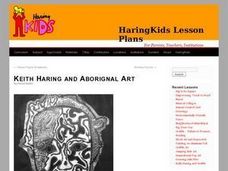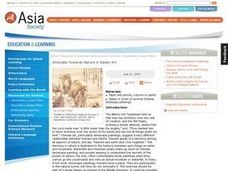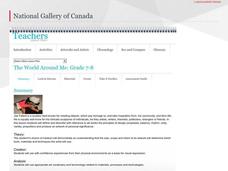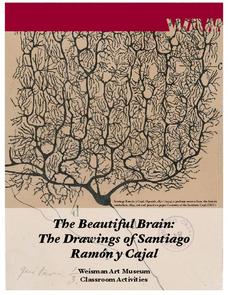Curated OER
Greek Mythology: Cultures and Art
Students examine literary arts. In this Greek mythology lessons, students read Greek myths and select characters from the myths to study. Students create watercolor illustrations of the characters, write short stories about the...
Curated OER
Art and Artists: Diversity of Learners Adaptation
Students determine the style of place cards as well as how to display phots of artwork. They organize and design an art museum for parents and other students to enjoy. Students create place cards to explain the artwork, artist, as well...
Curated OER
The Art of Violence
Violence and human suffering, as represented in art and film, are the focus of an investigation of the power of visual images and the moral implications of such representations. Class members examine “Guernica,” Pablo Picasso’s massive...
Curated OER
Keith Haring And Aboriginal Art
Students explore the art of Keith Haring and examine how it relates to Aboriginal art. In this fundamentals of art lesson, students examine the fundamental elements of art, such as, line, symmetry, contrast, balance, color tints, and...
Curated OER
Overcoming Censorship Through Art
Young scholars create an art piece that expresses their opinions while circumventing hypothetical government restrictions in this lesson on art and government censorship. Emphasis is placed upon historical instances of censorship around...
Curated OER
Attitudes Towards Nature in Daoist Art
Students examine Daoist art. In this art appreciation lesson, students illustrate a poem, then create a second illustration in the Daoist fashion while focusing on depicting the harmonious relationship between humans and nature.
Curated OER
Understanding Symmetry Through Visual Art
Have your class explore symmetry, radial balance and fractional parts in natural and man-made objects in their environment. Learners list examples and identify symmetrical and asymmetrical designs. Pupils are given a box of crayons and...
Curated OER
Allegory in Painting
High schoolers examine how allegory is defined and used in the visual arts. They create a list of the arts, and list the objects, symbols, and figures that suggest each art category, analyze various paintings, and identify the...
Curated OER
Self-Promotion
Middle schoolers create "assemblage boxes" displaying representations of themselves and the importance they see in their own lives. This middle school level lesson emphasizes the art of American artist Sarah Goodridge who has success in...
University of Minnesota
Beautiful Brain: Do You See What I See?
Can art play tricks on your eyes, and can a still painting really appear to vibrate? The second lesson in a four-part series discusses the way our beautiful brains translate visual images. It highlights the style of optical art and...
Curated OER
Come Tool Along With Me
Students create metallic Bas-relief scultures using basic art supplies and the technique of "tooling" in this Art lesson with croos-curricular connections in Social Studies and Math. A scoring rubric is included for assessment and...
Curated OER
What Shapes Can You See?
Students investigate shapes in art. In this visual arts lesson, students examine the ancient Panamanian "Plaque" and identify the geometric shapes in the art piece. Students combine basic shapes to make an artistic picture of their own.
National Gallery of Canada
The World Around Me
Have your learners use their surroundings as inspiration for an art project. Class members first examine and discuss art. They then choose an area and spend five days taking down observations in written and sketch form. These...
Curated OER
Poetry of War and Peace
Students read and discuss the poem "In Flanders Fields," then write poems evoking images of peacetime. They practice the techniques of writing poetry while using textual imagery to create visual images.
National Gallery of Canada
Lumps, Bumps, Gritty, and Soft!
Texture can really add to a work of art. Explore texture through observation and practice. Learners view and discuss works of art by M.C. Escher. They then create their own texture samplers with six different materials.
Curated OER
Birch Bark Biting
Fifth graders create birch bark biting art pieces. In this aboriginal art lesson, 5th graders produce art using birch bark. Students present their art pieces and explain their designs.
Curated OER
Terrific Tessellations
Students create to pieces of artwork using two primary colors and tessellation techniques. This is an excellent lesson that can be accomplished using standard art techniques or educational software such as Adobe Photoshop or Microsoft...
Art Institute of Chicago
Color Combinations
Explore color through an examination of pointillism and light. Class members view Georges Seraut's famous painting on a computer, zooming in and out to see the details and effects of the technique. They then cover how light and color are...
Media Smarts
Teaching TV: Television Techniques
As part of a five-lesson unit on how television uses technology and film techniques to communicate meaning, elementary students create their own media productions that demonstrate their understanding of these concepts.
Akron Art Museum
Storytelling Resist
The illustrations of Ezra Jack Keats in The Snowy Day inspire young artists to examine shapes in illustrations and to use these shapes to create their own watercolor resist painting.
PBS
Women's History: Glass Windows; Glass Ceilings
Discover stories about women's history in beautiful stained glass windows. The second in a three-part series teaches scholars about a famous artistic style of stained glass windows and the influential women that used art to impact...
University of Minnesota
Beautiful Brain: Strangest Dream
Do words change or add meaning or interest to a work of art? The final lesson in a four-part series on the beautiful brain as a work of art focuses on art analysis. Scholars write a story about exploring art from the inside. Reflections...
National Gallery of Canada
Picture This!
Introduce your class to Inuit prints and use these artworks as inspiration for a printmaking activity. Pupils make stories to go along with the images and then come up with their own heroic moments to illustrate. They take moments from...
National Gallery of Canada
Reading Sculptures
Consider the elements and principles of design closely while examining works of art. Learners select an image from the provided pieces to write about in relation to the elements and principles of design. They then sketch and sculpt their...

























